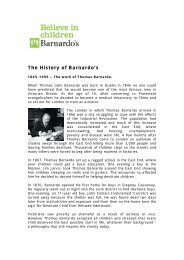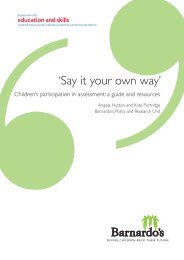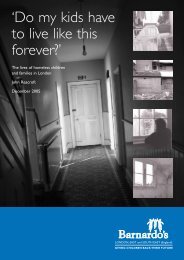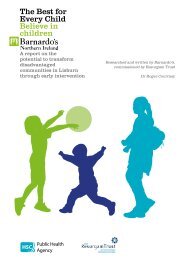Splintered Lives - Barnardo's
Splintered Lives - Barnardo's
Splintered Lives - Barnardo's
You also want an ePaper? Increase the reach of your titles
YUMPU automatically turns print PDFs into web optimized ePapers that Google loves.
PAGE 24<br />
chapter<br />
6<br />
that of an 'unwilling' woman.<br />
That both 'fantasy' and 'acting out' are used within these arguments, depending on<br />
whether the subject is pornography or prostitution, reveals a fundamental<br />
inconsistency, and undermines the credibility of this perspective.<br />
Sexual Freedom<br />
The sexual freedom model is an alternative to all the above, and is based upon a belief<br />
that all laws on sexual conduct, excluding where force and violence are used, are an<br />
incursion into individual freedom and privacy, and as such are a form of coercive social<br />
control. This has been argued most cogently in relation to children and young people by<br />
self-defined paedophile groupings; PIE (Paedophile Information Exchange) in Britain<br />
and NAMLA (North American Man/Boy Love Association) in the USA. The support for<br />
what has come to be coyly called 'inter-generational' sex, has extended in recent years<br />
to include a proportion of those who have defended pornography from feminist criticism<br />
(Rubin, 1984; Owens, 1986). The philosophical assumptions which are the basis<br />
of this perspective are:<br />
�� that paedophilia is a sexual orientation, paedophiles are, therefore, an<br />
oppressed minority, with whom other sexual minorities ought to have a<br />
'natural' affinity;<br />
�� that 'inter-generational' relationships are not just about sex, but beneficial and<br />
based on a form of love that is more honest than most familial relationships;<br />
�� that what is seen as sexually abusive varies culturally, and that in some cultures<br />
adult/child sex is acceptable; that children are sexual beings, but this is denied<br />
and controlled by adults;<br />
�� that consensual sexual relationships are possible between children and adults.<br />
Critics of this position (see Liddle, forthcoming, for a summary) have raised a number of<br />
uncomfortable issues including: that it is overwhelmingly men who argue this position;<br />
that it is invariably adults arguing (albeit in disguised forms) for their right to be sexual<br />
with children, usually boys; sexual activity is prioritised above other rights children lack,<br />
such as the right not to be hit, or to sex education; that the condition of childhood is not<br />
simply a product of oppressive social relations (as can be argued in relation to gender,<br />
race and sexuality)13, but a stage in human development. Children will, therefore, always<br />
be in a position of disadvantage in relation to adults, making non-coerced consent<br />
problematic. Whilst the most eloquent supporters of the sexual freedom position clearly<br />
locate themselves within the gay and/or paedophile movements (Sandfort, 1987) there<br />
are some heterosexual groupings which promote similar arguments, particularly<br />
sexualised family relationships. One of the most well known is the Rene Guyon Society<br />
based .in the US, whose slogan has been "sex before eight or else it's too late". In 1990<br />
……………………………………………………………………………………………………………………………………………………………..<br />
13. Although current constructions of childhood do indeed embody oppressive elements.
















